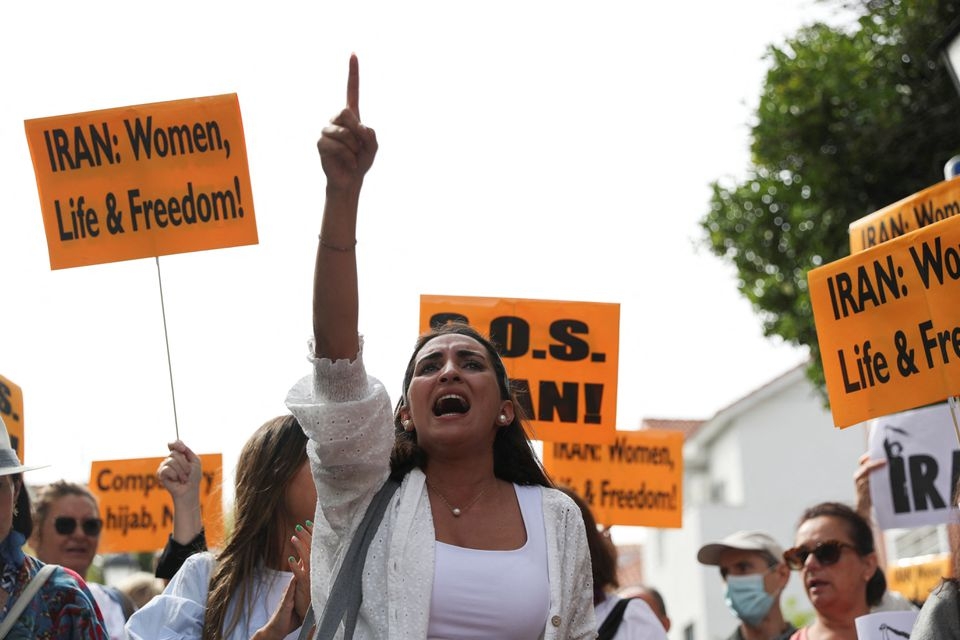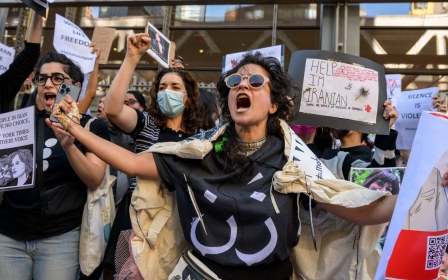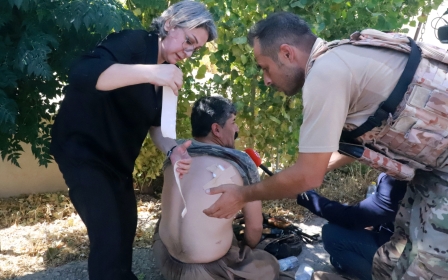Kurds unite Iranian protest movement through 'Women, life, freedom' slogan

Protests have been ongoing in Iran in the wake of the death of Mahsa Amini, the 22-year-old Kurdish woman died in hospital on 16 September after being detained by Iran's "morality police" for "inappropriate" hijab.
The demonstrations that followed have engulfed the country, but have heavily centred around Amini's home province of Kurdistan where grievances over the decades-long discrimination meted out against Iran's Kurdish minority have merged with opposition to the country's mandatory headscarf law and the morality police.
One slogan that originated in the Kurdish movement, in particular, has spread from the Kurdish region to become the banner of the uprising: "Women, life, freedom".
The slogan is thought to have been coined by Abdullah Ocalan, the imprisoned founder of the Kurdistan Workers Party (PKK), a Kurdish armed group founded in Turkey in 1978 that since the 1980s has fought a guerilla war with the Turkish state.
The group has developed a wide network of partner organisations across the Kurdish regions of the Middle East, as well as in Europe, including a wing in Iran, the Kurdistan Free Life Party (PJAK).
The various wings of the PKK, which is classified as a terrorist organisation by Turkey and the European Union, have emphasised a secular feminist ideology with its female cadres becoming internationally renowned for fighting the Islamic State group in Iraq and Syria.
Regardless of its origins, however, the slogan has been adopted throughout the demonstrations, which have so far left at least 133 dead, according to rights groups, and seen mass arrests of activists and journalists.
While Amini's death has brought widespread outrage and galvanised Iranian society, the impact on the Kurdish minority, the third largest ethnic community in the country after Persians and Azerbaijanis, bears watching.
'The powerful social media images, the slogan 'Woman, Life, Liberty', the message left on her [Amini's] coffin 'your name shall be our password' all came from Kurdistan'
- Massoumeh Torfeh, researcher
Massoumeh Torfeh, a research associate at LSE and SOAS, University of London, specialising on Iran and Afghanistan said that, so far, the protests had largely focused on the hijab issue rather than drawing in the "Kurdish question".
"The protests are about women's freedom to choose what they wear. This killing, just for hijab, was a first," said Massoumeh, speaking to Middle East Eye, adding it had "enraged people across the country".
"But Kurdistan took the lead in condemning the morality police and other authorities."
Only a few days after the protests, the Kurdish-majority town of Oshnavieh in Iran's West Azerbaijan province briefly fell into the hands of protesters on 23 September.
In Oshnavieh, protesters set fire to government offices, banks and a base belonging to the feared Islamic Revolutionary Guard Corps (IRGC).
"Three days of demonstrations in Saqqez and several other cities and towns in Kurdistan province, such as Sanandaj and Oshnavieh, gave energy and impetus to the call for investigations and the demand for stopping such attacks," said Massoumeh.
"But by then, it was probably too late."
'Your name shall be our password'
The translation of "Women, life, freedom" from Kurdish into Persian, the related language spoken by the majority in Iran, has underscored a shared platform for change in the country, but also linked the demonstrations to the wider regional pro-Kurdish movement in the mind of the government.
On 28 September, the IRGC bombed Iranian-Kurdish targets inside Iraq's autonomous Kurdish Regional Government (KRG) with missiles and drones, killing at least nine people. The main focus of the strikes was the Democratic Party of Iranian Kurdistan (PDK-I), a rival group to the PKK which has also maintained an armed struggle against the Islamic Republic for decades.
In a bid to contain the protests, Iranian authorities have sought to shut off internet access in parts of Iran, particularly Tehran and the Kurdish regions of the country, and blocked access to platforms such as Instagram, WhatsApp, and other messaging apps.
"The powerful social media images, the slogan 'Woman, life, liberty', the message left on her [Amini's] coffin 'your name shall be our password' all came from Kurdistan and had an immediate impact with hashtags of support," said Massoumeh.
In recent weeks, the IRGC has also bombed Kurdish parties based on the border of the Kurdish region in Iraq. But Iran's attack inside Iraq marked the first time such groups were targeted.
Iran has accused Kurdish groups in Iraq of seeking to incite chaos. Some social media accounts attempted to spread a rumour that Amini herself had been a member of the left-wing Kurdish armed group Komala.
Kurdish political groups have rejected the claims, however, saying that their focus is on "establishing greater coordination between the demands of the people of Kurdistan and the nationwide campaign in Iran, as well as trying to organise large opposition protests against the Islamic Republic abroad".
Iran's response to greater calls for freedom by the country's Kurdish community risks re-kindling resistance groups that have laid largely dormant for decades.
In a speech earlier this month, Iran's Supreme Leader Ali Khamenei sought to dispel the idea that Kurds in the country were a separatist entity, blaming instead outside forces.
"The Kurds are one of the most advanced Iranian ethnicities. They care about their homeland, they care about Islam, and they care about the Islamic system. The enemy's schemes will not work, but they work on them anyway," said Khamenei.
'Gaining momentum'
While Iran's constitution on paper guarantees ethnic minorities equal rights, the use of their language and practise of their traditional customs, this is not the reality for Kurds in Iran, Amnesty International has said in the past.
Amnesty has also called out the Iranian government for not taking "sufficient steps to eliminate discrimination or to end the cycle of violence against women and punish those responsible" for acts committed against Kurds.
In particular, Amnesty has said women are the victims of violence on a "daily basis and face discrimination from state officials, groups or individuals, including family members".
"Since the early days of the revolution, the pounding of Kurdish militants by the IRGC has never ceased," said Massoumeh.
"The Kurdish groups such as the PKK, KDPI, and Komala are perceived by the IRGC to be separatists and terrorists intent on causing discord across Iran. But since the protests began this September, attacks against these groups have intensified with the IRGC openly admitting them on both sides of the border in their affiliated website Tasnim News."
The UN has also warned about the second-class treatment of the country's Kurdish community, amongst other minorities.
Iran has a selection process for state officials and employees, known as "gozinesh", which requires them to demonstrate allegiance to Iran and the state religion, which is defined in the constitution as Shia Islam.
For the vast majority of Kurds who are Sunni Muslims, such requirements could limit, if not hinder, their opportunities to work for the state.
The call by Kurdish-Iranian groups in the KRG for a general strike in what Kurds call Rojhelat - or Eastern Kurdistan in Iran - has led authorities to use even more force against the protesters, arresting thousands.
The plight and slogans emanating from the country's Kurds, however, far from splintering the broad-based resistance to Iranian authorities, have united different cross-sections of society.
Middle East Eye propose une couverture et une analyse indépendantes et incomparables du Moyen-Orient, de l’Afrique du Nord et d’autres régions du monde. Pour en savoir plus sur la reprise de ce contenu et les frais qui s’appliquent, veuillez remplir ce formulaire [en anglais]. Pour en savoir plus sur MEE, cliquez ici [en anglais].




